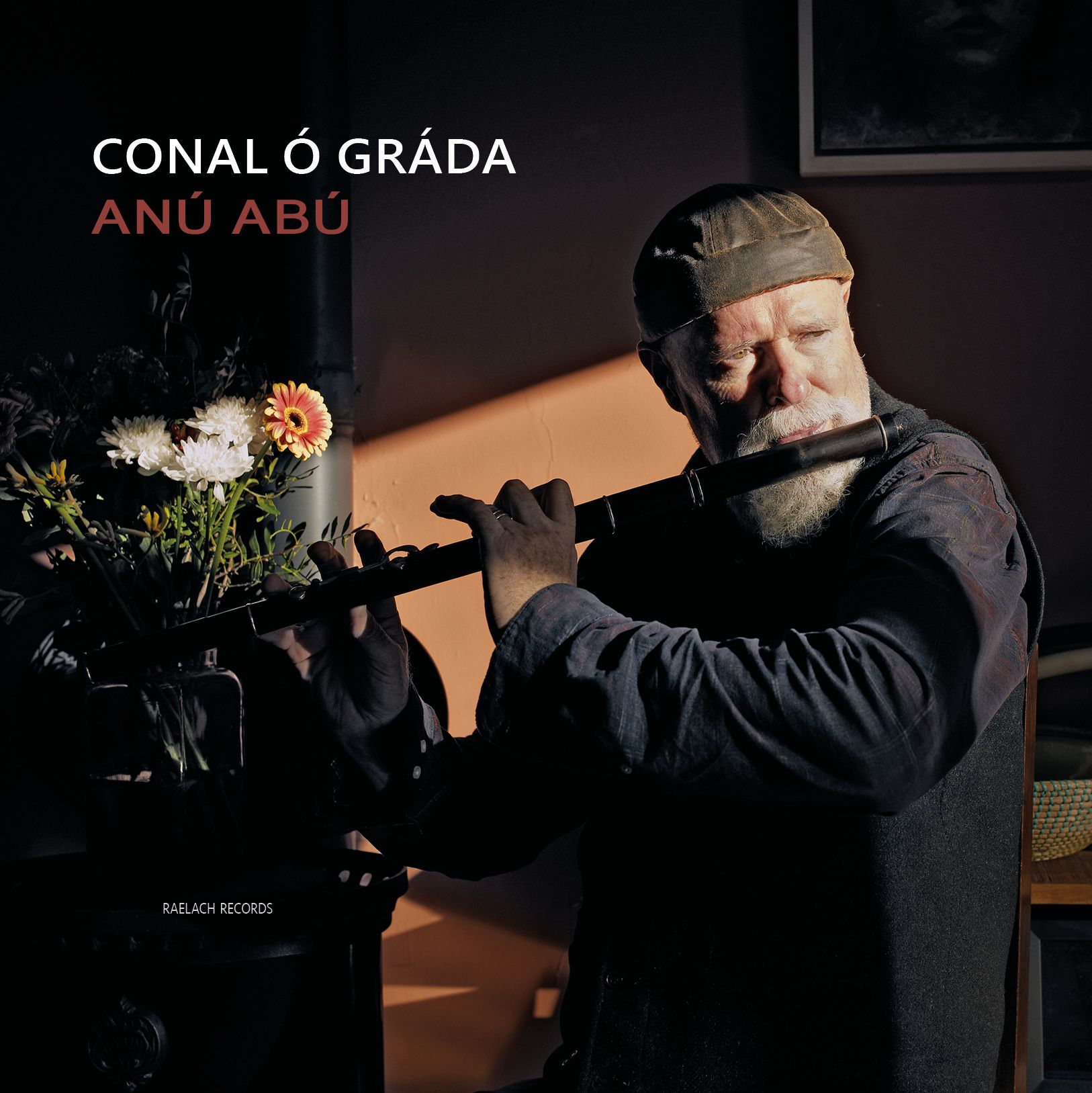I know I write this every time, but releases from the Ireland-based record label Raelach all seem to carry a sort of imprimatur that confers upon them the assurance of finest quality. Over the years, they’ve put out important and excellent recordings by the likes of Tony Linnane, James Cullinan, Noel Hill, Diarmuid Ó Meachair, the group Keane, Connolly, McGorman and Tony MacMahon, just to name a few, and they never disappoint.
In the player this week is “Anú Abú” by flute player Conal Ó Gráda, Raelach’s latest offering. Ó Gráda is one of the music’s great flute players and this album is an excellent demonstration of his extraordinary ability, upholding Raelach’s sterling reputation. The tunes Ó Gráda’s included here are all original, recent compositions, they’re played with great flair, and to realize his music he’s brought in an exceptional supporting cast that includes Caoimhin Ó Fearghail (guitar & bouzouki), Colm Ó Murchú (bodhrán), Caitríona Frost (marimba, drums, tambourine, brooms, and jawbone), and Benny McCarthy (accordions). It is a superb effort that will delight fans of traditional music.
From Cork, Ó Gráda is an in-demand teacher who is popular at summer schools like the Willie Clancy and the Catskills Irish Arts Week, and his book “An Fheadóg Mhór…Irish Traditional Flute Technique,” in which explores technique and styles is an enlightening and widely embraced resource for musicians. He has two prior solo albums, including “The Top of Coom” (1990) and “Cnoc Bui” (2008), both of which are excellent, and with Benny McCarthy, Dave Sheridan, Colm Murphy, and Nell Ní Chróinínhe, he’s a member of the band Raw Bar Collective (for more, see https://bennymccarthy.net/).
As I’ve already suggested, the playing on this album is superb. Ó Gráda’s tone, rhythm and articulation are as good as it gets, but if you know Ó Gráda’s music you’ll know that this is expected and it’s the quality of the musicianship that really elevates the compositions. “Benny’s Gone to Vega / …” is a lovely set of tunes to open up the album, and “Nóta Stóta / …” the jigs that follow, are simultaneously interesting and engaging. Both showcase Ó Gráda’s fine skills both as a player and as a composer.
But as I listened, my attention was really grabbed by a pair of later tracks, the polka set “An Gadaí / …” and then the set of marches, “Tan Ann / ….” The polkas are just lovely tunes and have a Sliabh Luchara sensibility, but it was the marches that lifted my experience of the album, both for their arrangement (which leans heavily on the bodhrán and then the snare drum, that together confer a “battle march” effect) and for the quality of the compositions. These are great tunes, which I suppose is not a thing commonly said about marches. But, his flair for writing marches (and slow airs, too, of which there are a couple on this album) is reinforced elsewhere in the track “Caoineadh Chúm na nag / Ceim Gharbh na Marbh.” The slow air that starts here is haunting and beautiful and the march that follows is its perfect complement. Different in character from the marches on the other track, it, together with the air, tells a story through an arrangement that uses percussion and accordion to build dramatic tension.
Every one of the tracks on this album has something to recommend it. Both waltzes in the track “An Sceach Gheal / An Damh Dubh” sport fine melodies, the first with a lovely, built in playful flourish and the second with a more serious tone, and both are eminently danceable. The tasteful, accompaniment, which consists of guitar and very light, almost imperceptible, percussion both add to the track’s flavor. Ó Gráda’s slides “The Dark Slide of the Moon / …” are deftly crafted and sound “old” in the way you’d want them to sound. Great stuff all around.
Incidentally, in June 2021 Ó Gráda was featured in the Irish Traditional Music Archive’s “Saothar” series, which showcases compositions by contemporary artists composing in the traditional idiom. Some of the tunes on this album were included in that feature, which can be seen at https://www.itma.ie/saothar/conal-o-grada/.
You can’t go wrong with Raelach and this new album from Conal Ó Gráda shows us why. “Anú Abú” is an album of exceptional and beautiful music from one of the top players in the the tradition. The playing is of course excellent, but its compositions – and the colors and textures that the arrangements bring to them – that set this particular album apart. If you love traditional music played with strength and passion, consider this a must-have album. For more info and to purchase, visit Ó Gráda’s website, https://www.conalograda.com/.








